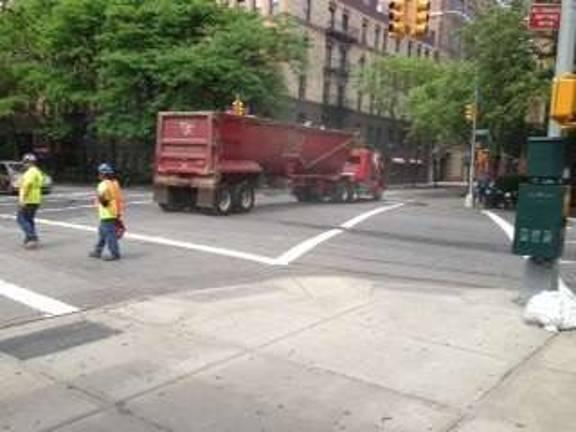Marine Transfer Station Troubles

Lawsuit against city and mayoral candidate outcry adds fuel to the fire In a lawsuit currently before the New York State Supreme Court, Assembly Member Micah Kellner has sued the Department of Sanitation and the city on the grounds that the current plan for the 91st Street Marine Transfer Station goes against the 2006 Solid Waste Management Plan. In the original plan, the city planned to distribute waste to three new Marine Transfer Stations: the 91st Street Station near Asphalt Green, Gansevoort in the West Village, and another at 59th Street. Because the latter are about 10 years from construction - three behind the 91st Street Transfer Station, Kellner said the city must create a new Environmental Impact Statement, and immediately stop all construction and planning at 91st Street. At the hearing last week, the State Supreme Court heard both sides. "To say a whole generation is going to go by before the other two stations will be finished when they were supposed to be constructed in tandem, one can assume that we will take on the burden of collecting more trash," said Kellner. The plan for the 91st Street Marine Transfer Station, as it stands, states that the MTS will handle about 30 percent of Manhattan's residential waste, and eight percent of the borough's commercial waste. In addition, the cost of the project has slowly escalated, from an original 30 million-dollar estimate, to $180 million. An independent budget office, however, calculated earlier this year that the actual cost of the project would be closer to $245 million, and might grow even larger. Right now, the city has a permit from the Department of Sanitation to transfer 1800 tons of trash per day, but the permit of operation is up for renewal in the fall. The lawyer for the plaintiff, Albert Butzel, said that the city could very well increase the maximum garbage allowed to 5000 tons per day, which would create even more of an environmental, air quality and safety impact on the neighborhood. "As far as the DEC and city sanitation are concerned, it's going to be a lovely facility that has no adverse environmental effects other than noise, and it's very hard to prove otherwise," said Butzel. City Council Speaker and mayoral candidate Christine Quinn, who has not changed her position on the plan, says that if the transfer station were built in a traditionally low-income neighborhood, the effects would be disastrous. "I am incredibly proud to stand up for all five boroughs, to stand up for people with asthma and children with asthma who have been put upon for too long by the City of New York, and to say that every borough has to do its fair share in taking care of its garbage," said Quinn in a recent statement. But Pledge 2 Protect, the new non-profit that has been collecting signatures opposing its construction, say that her claims are inaccurate, saying that in terms of health effects, Yorkville is just as much, if not, more of an at-risk neighborhood with 62 percent more minorities than any other proposed site. The main arguments of the opposing side are that the city has done everything legal within its power to ensure an accurate assessment of environmental impact, and the concerns by the neighborhood are purely speculative. In its respondent brief, The department of environmental conservation claims that the city cannot be sued based on intangible complaints, and injuries that have not yet occurred. "The effects hypothesized by petitioners would require at least several uncertain future events to occur first: (1) the actual construction of the East 91st St. facility; (2) the failure of the City to construct the Gansevoort and West 59th St. waste processing facilities; and (3) decisions by private commercial waste carters to attempt to use the East 91st St. facility rather than transporting commercial waste out of the City by truck," the statement reads. Kellner said that he is not buying the city's argument of speculation. "The city is saying you're being speculative and you should wait until it's built. If it's already built, this neighborhood will become a parade of both public and private garbage trucks." In fact, the process has already begun, illegally. Uncovered trucks were spotted recently carrying away debris from the old Marine Transfer Station. The company contracted to build the new transfer station, Skanska USA, had agreed to transport debris from the old site only via enclosed trucks, but a concerned citizen recently snapped photos of trucks driving out of the site with open tops. "Dust and debris was spewing out of them along with jagged metal," said Kellner. "Skanska is already cutting corners when it comes to the community's safety. If this is a harbinger of things to come this is bad news for Yorkville." The Assemblyman said that he actually hopes that putting the project at a standstill will slow down the momentum of the construction, and the idea will be abandoned altogether. "The best outcome that they demolish current site, whether we win the lawsuit or the next mayor says this is a waste of city dollars, and then they can turn that platform into park space that the community needs. It would be a win-win."